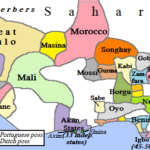The colonial period of Nigeria, spanning roughly from the late 19th century to the mid-20th century, is a significant era marked by British conquest, consolidation, and administration, which profoundly shaped the socio-political and economic landscape of modern Nigeria. Here’s an in-depth look at this period:
Early European Contact and Trade
Portuguese and Other Europeans
- Portuguese Arrival (15th Century): The Portuguese were the first Europeans to establish contact with Nigeria, focusing on trade along the coast.
- Transatlantic Slave Trade (16th – 19th Century): Nigeria became a crucial region for the slave trade, with millions of Africans forcibly taken to the Americas. This period had a devastating impact on Nigerian societies.
British Expansion and Control
Initial British Presence
- British Trading Interests: By the early 19th century, British traders, primarily involved in palm oil trade, established a presence in the Niger Delta and along the coast.
- Abolition of Slave Trade: Following the abolition of the slave trade in 1807, the British shifted their focus to legitimate commerce, particularly palm oil.
Annexation and Treaties
- Lagos Colony (1861): The British annexed Lagos in 1861, making it a crown colony to protect their trading interests and suppress the slave trade.
- Protectorates Established: The British gradually extended their influence inland through treaties, military conquest, and strategic alliances.
Consolidation of British Rule
- Protectorate of Northern Nigeria (1900): Formed after the British defeated the Sokoto Caliphate and other northern entities, establishing indirect rule through local emirs.
- Protectorate of Southern Nigeria (1900): Comprised territories in the south, including the Yoruba and Igbo lands, governed more directly by British administrators.
- Amalgamation (1914): The British amalgamated the Northern and Southern Protectorates and the Lagos Colony into the Colony and Protectorate of Nigeria for administrative efficiency and economic integration.
Administration and Impact
Colonial Administration
- Indirect Rule: Popularized by Lord Frederick Lugard, this system governed through existing traditional structures, particularly in the north. This approach was less effective in the south where centralized authority was less pronounced.
- Economic Policies: The colonial economy was oriented towards export crops (palm oil, cocoa, groundnuts) and raw materials, with infrastructure developments like railways serving colonial interests.
- Education and Religion: Christian missionaries played a significant role in education and conversion, especially in the south. Western education produced a new elite class that later led nationalist movements.
Social and Cultural Impact
- Ethnic and Regional Divisions: British policies often reinforced and exploited ethnic divisions, leading to long-term regional disparities and tensions.
- Urbanization and Migration: Colonial rule led to the growth of cities and internal migration, altering social structures and lifestyles.
Path to Independence
Rise of Nationalism
- Early Nationalist Movements: The early 20th century saw the emergence of nationalist sentiments, with groups like the Nigerian National Democratic Party (NNDP) advocating for self-governance.
- Influential Leaders: Figures such as Nnamdi Azikiwe, Obafemi Awolowo, and Ahmadu Bello emerged as key leaders, promoting Nigerian unity and independence.
- Political Parties and Movements: The 1940s and 1950s saw the formation of political parties like the National Council of Nigeria and the Cameroons (NCNC), the Action Group (AG), and the Northern People’s Congress (NPC).
Constitutional Developments
- 1946 Richards Constitution: Introduced regional assemblies, providing limited self-governance.
- 1951 Macpherson Constitution: Expanded regional autonomy and introduced a federal structure.
- 1954 Lyttleton Constitution: Further refined the federal system and set the stage for full self-governance.
Independence
- Steps to Sovereignty: Gradual devolution of power through constitutional reforms and elections in the 1950s.
- Independence (1960): Nigeria achieved independence on October 1, 1960, with a federal structure composed of regions representing the major ethnic groups. Nnamdi Azikiwe became the first President, and Sir Abubakar Tafawa Balewa the first Prime Minister.
Legacy of Colonial Rule
- Political Structure: The federal system and regional divisions established during colonial rule continued to influence Nigerian politics.
- Economic Patterns: The colonial emphasis on export crops and raw materials shaped Nigeria’s post-independence economy.
- Social Dynamics: Ethnic and regional divisions, urbanization, and the spread of Western education and Christianity left lasting impacts on Nigerian society.
The colonial period of Nigeria was a transformative era that laid the foundation for many of the country’s contemporary political, economic, and social dynamics.


